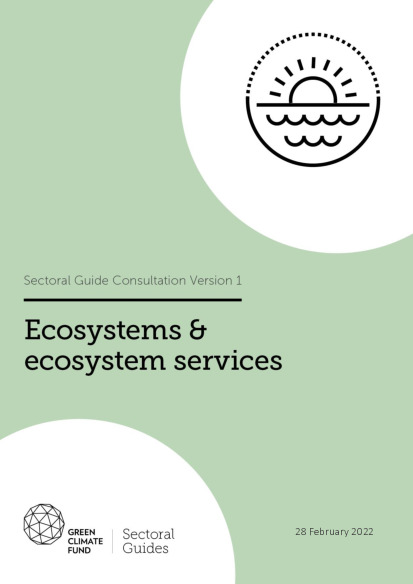Sectoral guide: Ecosystems and ecosystem services
The GCF recognizes the importance of the climate-nature nexus; and has given nature a high profile by including ecosystems and ecosystem services as one of the eight results areas of the fund, and by approving more than 1 billion dollars in projects and programmes related to conserving, restoring and sustainably managing ecosystems to enhance the adaptation and mitigation impact potential.
Ecosystems play key roles in our efforts to address climate change and they are essential for climate-resilient development pathways and account for 49% of global GDP; protected areas are vital for climate change resilience; and ecosystems provide vital ecosystem services Ecosystem degradation, loss, and the impacts of climate change induce a vicious cycle that increases the risk of ecological collapse and reduces our ability to rely on the climate mitigating effects and adaptive potential of natural ecosystems. High carbon ecosystems, such as peatlands and tundra, or those that cover large areas, hence encompassing enormous and irrecoverable carbon sinks are particularly important. Coastal wetlands play a key role in achieving resilient low emission development, including mangroves, coral reefs, seagrass beds and inland waterways. Furthermore, human encroachment in natural ecosystems and unsustainable exploitation of wildlife not only degrades ecosystem services but may also increase the risk of emerging novel viruses harmful to humans, such as the recent Covid-19 pandemic.
Specific to terrestrial and freshwater ecosystems are insufficient regulatory and legal protection, whereas coastal ecosystems and oceans see limited availability of finance for marine protection and restoration in general, and for coastal adaptation projects in particular. Overall, oceans are a very undervalued asset compared to conservation efforts around other terrestrial ecosystems.
The vision for a GCF paradigm-shift in ecosystems is to secure their resilience, functionality, and the maintenance of ecosystem services under conditions of climate change. This can be achieved through large-scale protection, restoration, and adaptive management along two paradigm shifting investment pathways: (1) ecosystem-based management of terrestrial and freshwater ecosystems and (2) ecosystem-based coastal and marine zone management. Enabling actions across both pathways aim to protect, enhance, and ensure connectivity of the major ecosystem types and biomes.
The sectoral guide draft was released for consultation between March 2021 and July 2021. The Secretariat received more than 600 suggestions and recommendations which are addressed in the current version of the guide. The sectoral guide will be submitted to the GCF Board for its consideration in 2022. In the meantime, GCF remains open to further feedback on this draft. For further inquiries please contact us via: [email protected].
